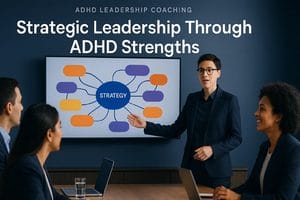What Defines the Executive Coaching Process?
The executive coaching process is a nuanced and multifaceted approach designed to enhance the effectiveness and leadership competencies of individuals in executive roles. Unlike life coaching, which often focuses on personal goals and well-being, executive coaching focuses primarily on professional development, management acumen, and organizational impact. The distinction between executive coaching and life coaching is crucial, as it highlights the specialized nature of executive coaching, aiming to unlock an individual’s full capabilities in a managerial role.
Key Components of Executive Coaching

Executive coaching encompasses several key components, each tailored to foster both personal and professional growth. The coaching process begins with goal setting, a fundamental step where a professional coach collaborates with the executive to identify and articulate their objectives. This is where the difference between a life coach and an executive coach becomes evident; while a life coach may focus on broader personal development, an executive coach helps hone in on skills pertinent to leadership and management effectiveness.
Regular coaching sessions serve as the cornerstone of the process, offering a space for reflection, strategic planning, and actionable feedback. These sessions underscore the importance of a strong coaching relationship, marked by trust and mutual respect, allowing the executive to explore solutions and overcome obstacles with their coach’s guidance.
Executive coaching vs life coaching also differs in the realm of action and experimentation. In executive coaching, the coach provides tasks and challenges designed to stretch the executive’s capabilities, encouraging them to step out of their comfort zone and apply new skills in their professional environment.
How an Executive Coach Helps Enhance Leadership Skills
A leadership coach or executive coach works closely with the client to develop critical leadership competencies, such as effective communication, strategic thinking, and team management. Through personalized feedback and the use of specific coaching principles, an executive coach can significantly impact an individual’s ability to lead with confidence and clarity.
The process often includes leadership development initiatives, where executives are guided to refine their leadership style and better align their personal values with their professional responsibilities. This targeted approach ensures that the coaching not only supports the individual’s growth but also amplifies their ability to guide their teams and influence their organization positively.
Before you proceed, interested in learning more about:
Executive Coaching and Organizational Impact
The impact of executive coaching extends beyond the personal growth of the individuals involved; it has a profound effect on the broader organization. By fostering leadership and management skills among key personnel, executive coaching services contribute to creating a more dynamic, responsive, and effective leadership team.
Executive coaches focus on aligning the personal development of the executive with the business objectives of the organization, ensuring that leadership improvements translate into tangible organizational benefits. This can lead to enhanced decision-making, improved team dynamics, and ultimately, a stronger organizational performance.

Moreover, by instilling a coaching culture within the organization, executive coaching paves the way for a continuous learning environment, where feedback, accountability, and personal development are valued and encouraged. This cultural shift can lead to higher employee engagement, retention, and a competitive edge in the market.
Understanding the Life Coaching Journey
The life coaching journey is a transformative process aimed at empowering individuals to achieve their personal and life goals. Unlike executive coaching, which is centered around enhancing leadership skills and professional development, life coaching delves into various aspects of an individual’s life, including relationships, personal well-being, and life balance. This journey is facilitated by a qualified coach who employs a holistic approach to help clients navigate life’s challenges and opportunities. By setting personal goals and identifying obstacles, clients are guided through a process of self-discovery, accountability, and action that promotes significant personal growth and life satisfaction. The life coaching journey is characterized by its broad focus, addressing the client’s entire life landscape rather than concentrating solely on their professional development.
Differentiating Life Coach Focuses from Executive Coaching
The primary distinction between life coaches and executive coaches lies in their focus areas. While executive coaching is primarily concerned with professional growth, leadership effectiveness, and organizational impact, life coaching concentrates on personal development, emotional well-being, and achieving a balanced life. Life coaches help individuals identify their values, passions, and life purposes, working towards achieving fulfillment in all life areas. In contrast, executive coaching is more targeted, aiming to enhance an individual’s performance within a corporate or organizational context. This differentiation highlights the importance of understanding each coach’s unique approach and objectives, enabling individuals to select the kind of coach that best aligns with their current needs and goals.
Life Coaches and Personal Growth Strategies
Life coaches employ various personal growth strategies to support their clients on their journey toward self-improvement and fulfillment. These strategies may include techniques for improving self-awareness, developing emotional intelligence, managing stress, and fostering positive relationships. By working with a life coach, individuals learn to set achievable personal goals, develop resilience, and cultivate a positive mindset. Life coaches often utilize tools such as mindfulness practices, journaling, and reflective exercises to encourage introspection and personal insight. These personal growth strategies are integral to the life coaching process, providing clients with the skills and confidence needed to navigate life’s complexities and achieve their desired outcomes.
Navigating Personal and Professional Development with a Life Coach
Navigating both personal and professional development can be a complex endeavor, one that life coaches are uniquely equipped to facilitate. By taking a holistic view of an individual’s life, life coaches can help bridge the gap between personal aspirations and professional ambitions. They assist clients in understanding how personal values and goals can align with their professional life, leading to a more fulfilling and integrated experience. This approach ensures that individuals do not have to sacrifice one area of their life for the sake of another but can instead find a harmonious balance that fosters both personal satisfaction and professional success. Through the life coaching process, clients gain clarity on their life’s direction, learn to manage their time and resources effectively, and develop strategies for maintaining a healthy work-life balance.
Choosing the Right Type of Coach for Your Needs
The journey of personal and professional development is unique to each individual, leading to the pivotal decision of selecting the appropriate coach. Understanding the difference between life coaching and executive coaching, alongside recognizing the qualities and offerings of each, empowers individuals to make informed choices that align with their specific needs and aspirations.
What to Look for in an Executive Coach
When seeking an executive coach, certain criteria should be prioritized to ensure that the coach can effectively address your professional development needs. A great executive coach typically has a robust background in business or leadership, with formal training and accreditation, such as from the International Coach Federation (ICF), highlighting their commitment to coaching excellence. Experience within leadership positions or extensive work with executive teams offers them the practical insight necessary for guiding others in similar roles.
Look for an executive coach who serves as a sounding board, offering objective feedback and challenging your thinking in ways that foster personal and professional growth. The executive coaching process should be used to develop leadership skills, with the coach working closely with the client to tailor coaching programs that support achieving leadership excellence. A focus on career coaching, particularly for those in or aspiring to leadership positions, is also a crucial aspect of what an executive coach offers. Their ability to navigate the complexities of executive life, professionally and personally, sets them apart, making them an invaluable resource for those looking to enhance their impact in the corporate world.
Identifying the Qualities of a Great Life Coach
In contrast, when exploring life coaching, the focus shifts towards personal growth and achieving a balanced, fulfilling life. A great life coach is someone who works with the client to uncover their true desires and potential, guiding them through the process of coaching with empathy, insight, and encouragement. Life coaches aim to address the client’s entire spectrum of life experiences, supporting them in finding harmony between work and life.
Qualities to look for in a life coach include a deep understanding of human behavior, excellent listening skills, and the ability to inspire and motivate. They should offer a supportive environment where the focus of life coaching—personal fulfillment, overcoming life’s challenges, and making impactful life choices—is at the forefront. Certification from reputable organizations like the ICF can also indicate a life coach’s dedication to their profession and their clients’ success.
When to Choose a Life Coach Over an Executive Coach
Deciding between a life coach and an executive coach hinges on understanding your primary goals and where you seek transformation. Choose a life coach when your objectives are broadly centered around personal fulfillment, relationships, well-being, and achieving balance between various aspects of life. Life coaching primarily caters to those looking to navigate life transitions, improve personal relationships, or find greater purpose and satisfaction in life.
On the other hand, whereas executive coaching is tailored for individuals in or aspiring to leadership roles who wish to bolster their professional skills, leadership effectiveness, and contribute positively to their organization’s success. This type of coaching would be more suitable for those focused on navigating the challenges of executive or leadership roles, seeking to enhance their professional impact, or aiming to advance their careers through personalized development strategies.
Ultimately, the choice between a life coach and an executive coach reflects a deep understanding of one’s current needs and future aspirations. By carefully considering what each kind of coach offers and assessing your personal and professional development goals, you can select a coach who will best support your journey to achieving your full potential, whether that journey is focused on your life personally or your executive career.
The Intersection of Executive Coaching and Life Coaching
The distinction between executive coaching and life coaching is clear in their primary focuses—professional development and personal growth, respectively. However, the line between these two coaching styles can sometimes blur, creating an intersection where both personal and professional development converge. This intersection acknowledges that the challenges faced by individuals in executive roles often span both their personal and professional lives, necessitating a holistic approach to coaching.
Understanding the Overlap Between Executive and Life Coaching
The overlap between executive and life coaching lies in the understanding that to be effective in one’s professional role, especially in leadership positions, one’s personal well-being and life outside of work must also be considered. Executive coaching often includes elements traditionally associated with life coaching, such as stress management, work-life balance, and personal values alignment. This is because the effectiveness of an executive is not solely determined by their professional skills but also by their personal resilience, emotional intelligence, and overall well-being.
The focus of life coaching on personal growth and achieving a fulfilling life can greatly benefit executives, who may find that their personal challenges impact their professional performance. Similarly, the leadership skills and strategic thinking nurtured in executive coaching are valuable not just professionally but in personal life management and decision-making as well.
How Professional Coaches Integrate Leadership Skills and Personal Development
Professional coaches, whether they specialize in executive coaching or life coaching, increasingly recognize the importance of integrating leadership skills with personal development. A leadership coach works with the client not only to enhance their professional capabilities but also to ensure that these capabilities are supported by a strong personal foundation. This integrated approach helps executives develop a leadership style that is authentic, sustainable, and reflective of their overall values and goals.

Coaches serving executives might use techniques traditionally used in executive coaching, such as goal setting and strategic planning, alongside methods more common in life coaching, such as exploring personal values and improving work-life balance. This blend ensures that the coaching serves the executive holistically, addressing their needs as both a professional and an individual.
Can an Executive also be a Life Coach?
The question of whether an executive can also be a life coach highlights the dynamic and versatile nature of coaching. An executive who has undergone significant personal and professional growth through coaching might find they possess the insight, experience, and empathy to guide others on similar journeys. This dual capacity requires a deep understanding of the coaching process, as well as the ability to navigate the distinct yet interconnected realms of personal and professional development.
Executives transitioning into coaching roles must be adept at working with clients to uncover and address both their professional challenges and personal aspirations. They need to be fluent in the languages of both executive and life coaching, understanding when to shift focus between the two to best serve their clients’ needs. This ability enhances the coaching relationship, offering clients a comprehensive approach that supports their entire being—professionally and personally.
With that said, while executive coaching and life coaching have distinct starting points, the journey of growth they facilitate often intersects, reflecting the interconnectedness of our personal and professional lives. Professional coaches who can navigate this intersection effectively are best positioned to support their clients in achieving a fulfilling, balanced, and successful life.
Navigating the Different Types of Coaching Services
The coaching industry offers a myriad of services tailored to various aspects of personal and professional development. Understanding the nuances and specialties of these services is crucial for individuals seeking to make informed decisions about their growth journey. This exploration involves comparing executive coaching and life coaching services, recognizing the role of the International Coach Federation in upholding coaching standards, and discerning how to choose between business coaching and personal coaching.
Comparing Executive Coaching and Life Coaching Services
When deliberating what’s the difference between executive coaching and life coaching, it’s essential to grasp that each serves distinct areas of an individual’s life. Executive coaching is primarily used in executive coaching to enhance the leadership capacity and professional performance of individuals in high-level positions. The executive life coaching process is designed to address the challenges and goals specific to professionals, helping executives navigate their career paths and leadership responsibilities effectively.
On the other hand, the focus of life coaching is on the broader spectrum of an individual’s life, addressing aspects such as personal fulfillment, relationships, and life balance. Life coaching serves to support individuals in achieving their personal aspirations, fostering personal growth outside of the professional context. This differentiation underscores how coaching differs in their approach and outcomes, emphasizing the importance of aligning one’s needs with the appropriate type of coaching.
The Role of International Coach Federation in Coaching Standards
The International Coach Federation (ICF) plays a pivotal role in maintaining high standards within the coaching industry. By providing accreditation to coaching programs and certification to individual coaches, the ICF ensures that both coach and client engage in a process that meets globally recognized professional standards. The ICF’s rigorous criteria for coaching effectiveness and ethical practice contribute to the credibility and reliability of coaching as a profession. For individuals working with a coach, seeking out ICF-accredited coaches or programs adds an assurance of quality and adherence to best practices, whether it be in executive life coaching or life coaching domains.
How to Decide Between Business Coaching and Personal Coaching
Deciding between business coaching and personal coaching involves a careful consideration of one’s current priorities and goals. Business coaching, akin to executive coaching, focuses on the professional realm, offering strategies and insights to navigate the complexities of business operations, leadership, and organizational growth. It helps executives and business owners enhance their leadership capabilities and drive business success.
Personal coaching, mirroring the objectives of life coaching, addresses the individual’s life or professionally unrelated aspects, such as personal well-being, relationships, and achieving a balanced lifestyle. It caters to those seeking improvement in their personal lives, away from the professional sphere.
For those at the crossroads of professional and personal development, understanding the unique offerings of each coaching type is crucial. The decision hinges on where the individual feels they need the most guidance and support at their current stage in life. Whether the focus is on ascending the corporate ladder, enhancing business performance, or cultivating a richer, more balanced personal life, selecting the right coaching service can significantly impact an individual’s path to achieving their full potential.
Navigating the different types of coaching services requires a deep understanding of each service’s focus, objectives, and the standards upheld by organizations like the International Coach Federation. By aligning one’s developmental needs with the specific expertise of a coach, individuals can embark on a transformative journey that best supports their aspirations and challenges, whether they lie within the professional domain or the personal sphere.
How Coaching Can Help You Achieve Your Full Potential
In the landscape of personal and professional development, coaching emerges as a powerful tool for unlocking an individual’s full potential. Whether through executive coaching, aimed at enhancing leadership and organizational impact, or life coaching, focused on personal growth and well-being, the essence of coaching is to facilitate a transformative journey. This journey not only propels individuals towards their goals but also fosters a deeper understanding of their capabilities, aspirations, and the pathways to success.
Finding the Right Coach for Personal and Professional Success
The key to achieving significant progress in any area of life lies in finding the right coach. This coach needs to not only possess the relevant expertise and experience but also align with the individual’s values, goals, and preferred style of interaction. The relationship between coach and client is pivotal; it’s the foundation upon which trust is built and from which growth can flourish. Therefore, when considering two types of coaching, individuals should reflect on their primary objectives—be it advancing in their career, enhancing leadership skills, or improving personal well-being—and seek a coach whose focus, approach, and methodologies resonate with their unique needs and aspirations.
Unlocking Full Potential with the Right Executive or Life Coach
The journey to unlocking one’s full potential is highly personal and requires a tailored approach. The right coach to help in this endeavor understands the nuances of their client’s aspirations and challenges. For those in leadership roles or aspiring towards them, an executive coach with a strong background in business, leadership development, and organizational dynamics can be invaluable. They provide the guidance, accountability, and insights needed to navigate complex professional landscapes and achieve leadership excellence.
Conversely, individuals seeking to enrich their personal lives, navigate life transitions, or achieve a greater sense of fulfillment may find a life coach to be their ideal partner in growth. A life coach focuses on the whole person, helping to clarify values, explore passions, and set meaningful personal goals. This holistic approach ensures that advancements in one area of life positively influence others, leading to comprehensive personal development and a more fulfilled life.
Personal Growth and Leadership Development through Coaching
Coaching is a dynamic and versatile process that caters to a wide range of needs and goals, from personal growth to leadership development. It serves as a catalyst for profound personal transformation, enabling individuals to explore and realize their full potential. Through a supportive and challenging coaching relationship, clients are empowered to set ambitious goals, overcome obstacles, and make significant strides towards their envisioned future.
Whether through executive coaching, focused on professional and organizational impact, or life coaching, aimed at personal fulfillment and well-being, coaching provides the tools, perspective, and support necessary for individuals to grow and thrive. By carefully selecting the right type of coach to complement their journey, individuals can ensure that they are well-equipped to navigate the path towards achieving their full potential, in both their personal and professional lives.
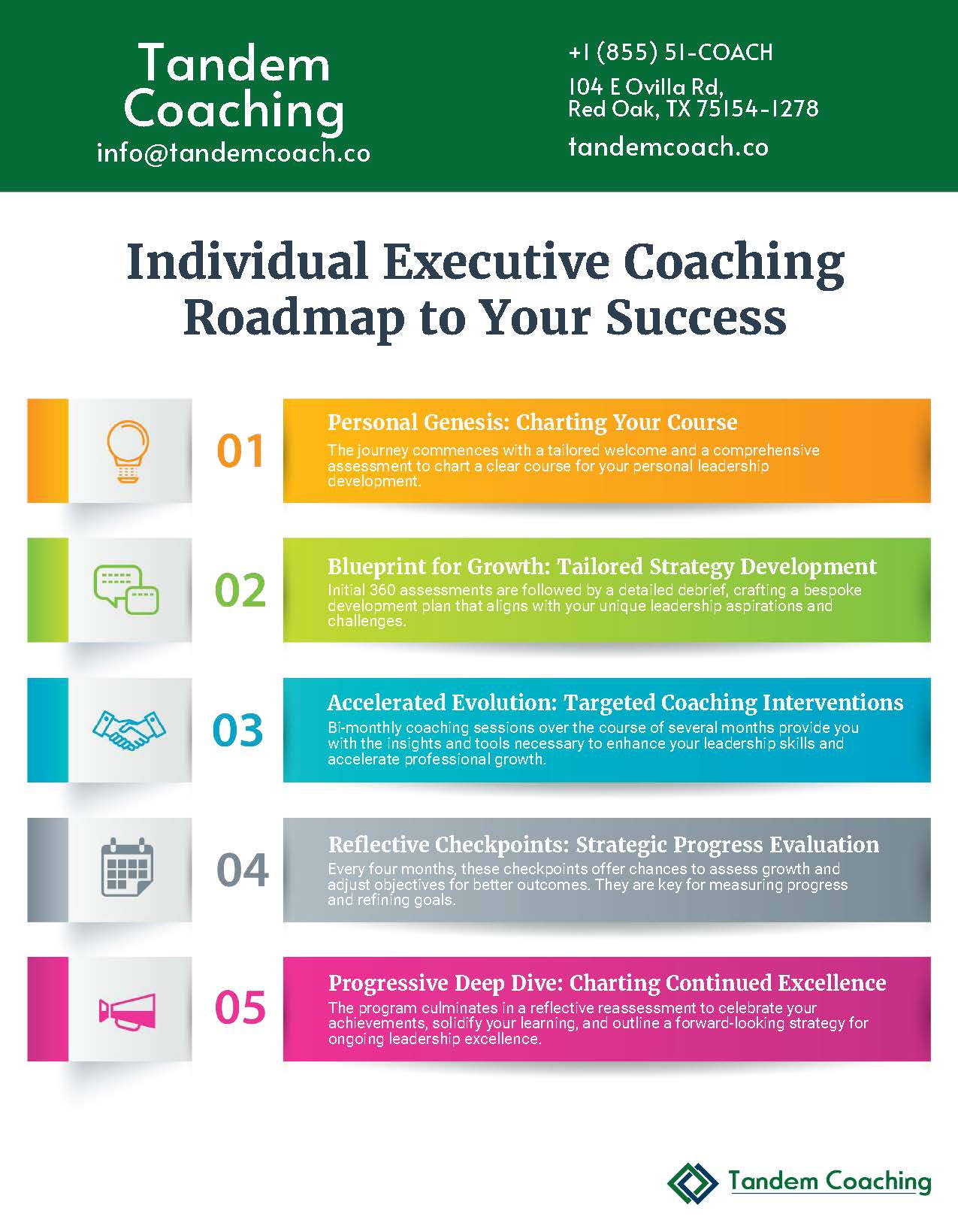
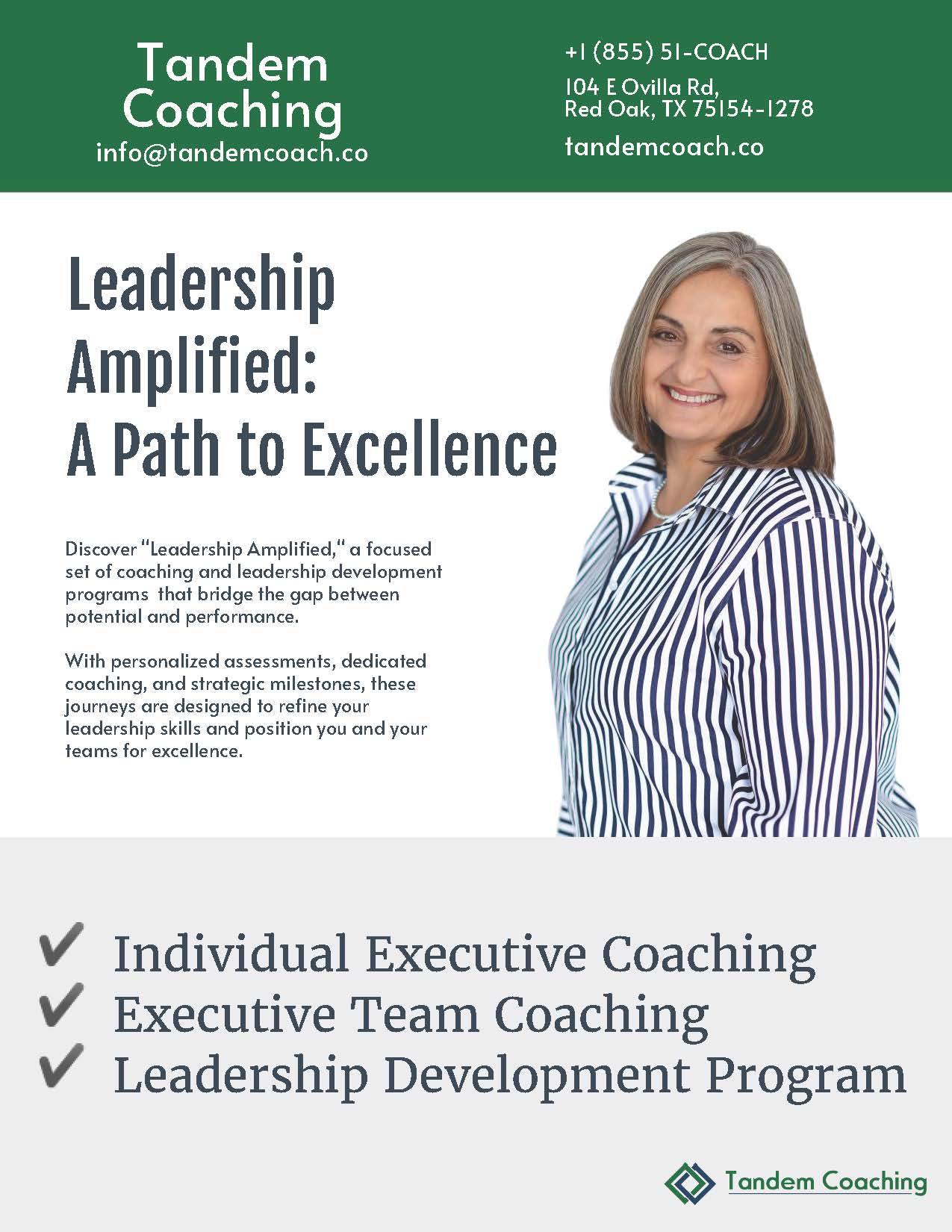
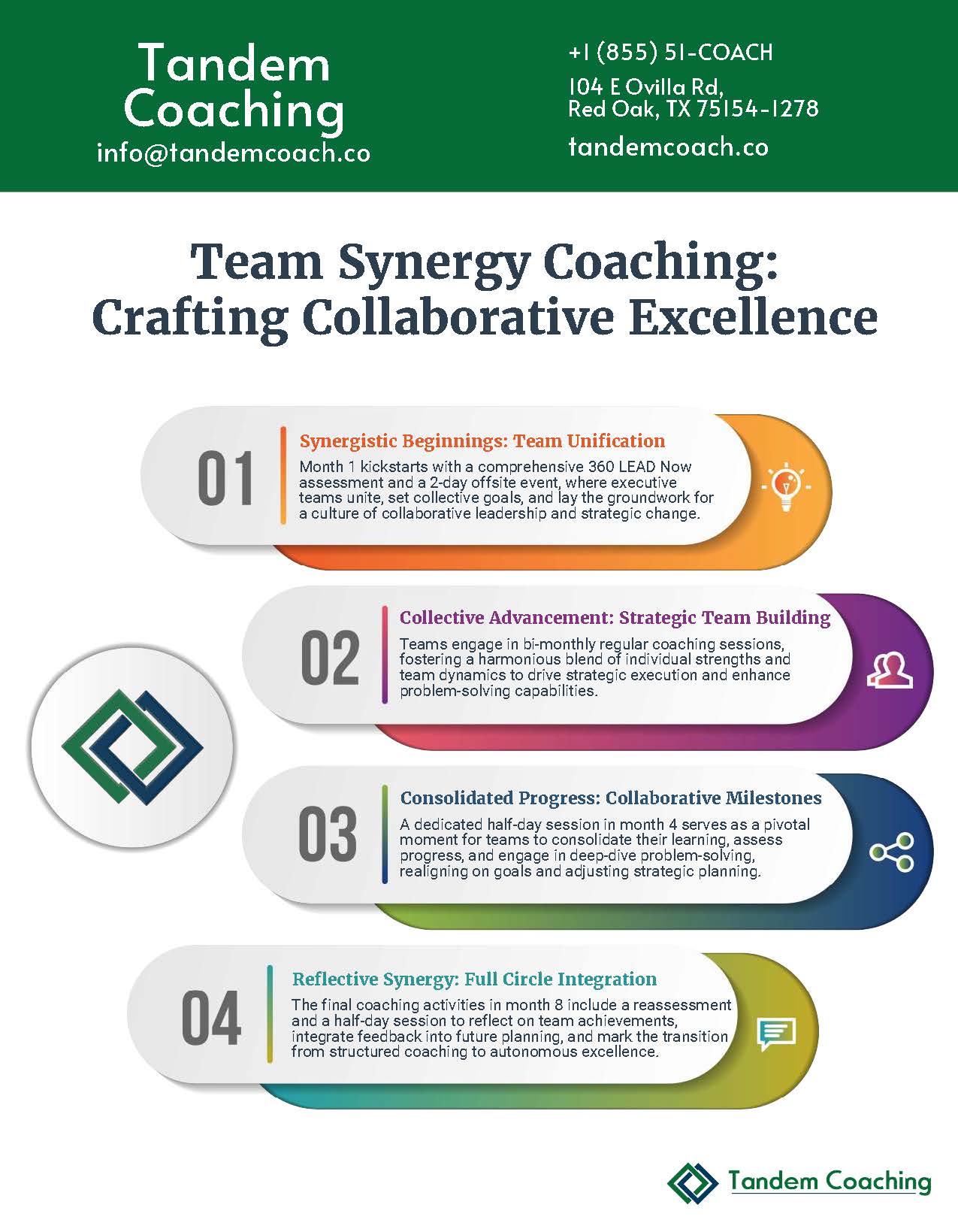
Boost Your Leadership Team Success!
Take your leadership team to the next level and achieve great results with our executive coaching.
Learn how our coaching and ASPIRE method can change things for you—get a free brochure to begin your journey.
About the Author
Cherie Silas, MCC
She has over 20 years of experience as a corporate leader and uses that background to partner with business executives and their leadership teams to identify and solve their most challenging people, process, and business problems in measurable ways.




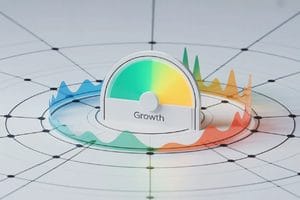


![Why is Leadership Development Important? [Quick Answer]](https://cdn.tandemcoach.co/wp-content/uploads/2024/08/TC-215.jpg)

